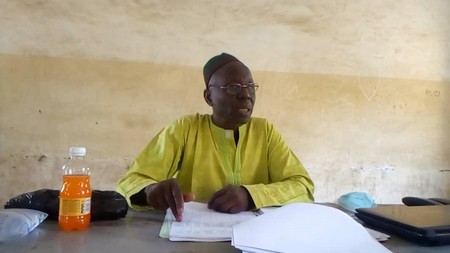
–
–
I am Malian living in Mali and I am a member of civil society. As such, I am pleased to share here my ideas in relation to the vital issues of the country, including the choice in 2022, of the future or the future post-transition President.
What cardinal criteria have I established for this crucial choice to come, in addition to the constitutional and legal criteria? Here is what I suggest as a response and as a contribution in determining such criteria by civil society, which can help to choose the best candidate.
Selection criteria
My future candidate will be the one who speaks fluently two of our national languages in addition to an international language. It is the one with whom I can talk about my survival problems first and then the future without necessarily going through a foreign language. I would be proud of my future President if he or she knew well the history of his or her land of origin and if he or she gave himself or herself a few times, the time to tell it, in his mother tongue, preferably.
Yes, I want a future President who is closer to the real life of his compatriots, because a President who is close and attentive to the needs and priorities of his constituents, must know the price of a kilo of meat, that of rice; tuition fees, according to levels and orders of education; pupils ‘and students’ difficulties in learning; the difficulties of peasants, fishermen, breeders, workers, traders, civil servants, business leaders, unemployed graduates, retirees, people with disabilities; problems linked to rapid climate change and desertification, etc. If he or she does not have mastery of information on these economic actors and on the evolution of certain planetary phenomena, he or she will not be able to lead them to changes or transformations of their qualitatively better living and working conditions. .
Prioritize the common interest
My future presidential candidate will be the one who knows the general problems common to Malians as well as the specific difficulties in each region of Mali, sector of activity by sector of activity. It is now established that in terms of information, the visits or tours of ministers or governors and the related reports are no longer sufficient to really understand the realities on the ground and the dynamics of inter and intra-community issues. In order to get informed at the source, my presidential candidate must get in touch with the realities on the ground, because being my future presidential candidate means first of all agreeing to go to listening to the populations and then working in the event of victory, for the satisfaction of their basic needs: security (s), education, health, housing, food, transport and telecommunications, etc.
All the credible candidates who have done this honestly and patriotically have become unforgettable presidents to their compatriots. Were they politically and socially smarter than their superficially doing so or not at all? Were they more empathetic towards Malians? Were they more visionary than them? Were they freer and more sovereign in their political decisions? Were they more imbued with their heavy and noble national responsibilities? If they were all of these at the same time (this is what I personally ended up admitting) and that they were recognized for having made memorable achievements for the well-being of the populations, without political calculation, but with realism and pragmatism, why would it be less glorious for future presidential candidates to do like them, in the event of victory?
Even if times have changed, the common interest, especially national interest, remains identifiable and diagnosable by all and at all times. Finally, were they for all that perfect and irreproachable? Certainly not, but despite the shortcomings, which exist in every human being, they have made us proud to be Malians and very proud of what they have left us as principles of governance: to think, consult, decide and always act mainly in function. of the common interest and according to the sacrifices to be made together for the greatness and development of Mali.
«Mali Koura Gnè Ta Sira»
If my future president or even my future President could draw inspiration from these principles and instruct his future ministers and regional administrators to take full ownership of them, we (civil society) will be tirelessly standing to rebuild with them and with even more pride, the Mali that we want more beautiful, more prosperous, bigger and respected everywhere as in the first years of our independence.
This great and noble patriotic ambition is achievable, especially since we have, inside and outside the country, qualified workers, technicians, executives, experts and even national scholars who are both patriotic and ambitious. as competent as it takes for that. In order for them to be mobilized around this ideal, we need a President who is a builder and integrity, a unifier and an enlightened and responsible team or orchestra leader who will not hesitate to rule out those of his team who will like to give a wrong note or who will pretend to work.
My future candidate for the Presidency will be the one who will understand and conceptualize what “Mali Koura Gnè Ta Sira” means; it is the one who may be able to bring about the real and profound changes to which his compatriots aspire, because he or she will have met them, listened to them, of course and understood them well. From this perspective, the false or false candidate will be the one who will make promises without a future, that is to say made to please and to seduce, but who will not refer to any quantified study or field research. and therefore no real and in-depth knowledge of either the frustrations or the priority needs of the populations.
My future candidate for the Presidency will be the one who accepts to debate contradictorily in the media, with other candidates, project of society against project of society, implementation program against program implementation. Why, during such democratic debates to come and to be institutionalized, it would not be possible to ask the future contestants-debaters, to sing individually one of the verses of the national anthem and to give some general indications on the possible composition of their planned governments as well as on the profiles of “ministers” (half technocrats from civil society, half from the more inventive and creative political class, taking parity into account for example)?
“Scalded cat is always afraid of cold water”
Knowledge by citizens of these indications on the profiles and on how to build such a government team in the name of the sacred union, would give, it seems to me, more confidence and hope to the voters and to the voters to choose knowingly, a unifying President who would undertake in doing so, to work with a tight government team, built not on a purely partisan or political basis of “Sharing of the electoral cake», But on criteria of patriotism, competence, integrity and admissibility.
This is a risk that future presidential candidates should take, because they would allow us to vote more for a team in which we have placed our trust than for a person, however eminent, knowing that “The scalded cat is always afraid of cold water”. Indeed, the precautionary principle and the postulate underlying this risk in transparency that it will now be necessary to take in order to regain the esteem and confidence of Malians, are that one can be disappointed more quickly by a President. as a single person in the maneuver, than by a whole team of which one would have participated indirectly in the pre-nomination.
The government preconfigured this way ” filigree», Can have an effective educational function and can be a psychological factor of adhesion and mobilization more powerful than the slogans of campaign written and diffused in French; campaign content, moreover, not very accessible to citizens, the majority of whom are illiterate in this language. This is where the use of one of the two national languages spoken by the candidate will be worth its weight in gold. This would be a novelty and an originality in Mali, which does not lack advantages of which it will however be necessary to know how to make intelligent use. Regarding such arrangements, what a great opportunity would be the transition period, if together we could think about it when re-reading the charter of political parties and that of the other texts relating to the elections! And if it is through a parliamentary regime that we will have to go through, why not go there as part of the much-requested overhaul?
Why this text?
To close my remarks on the criteria for choosing my candidate or even my future President, it should be remembered that this text comes after those I wrote for: 1 °) define “Mali Koura”, as a member of civil society (July 15 and August 6, 2020), through changes and expectations in terms of reforms to be made and ethical values to be cultivated there; 2 °) and to propose avenues concerning the revision of the 1992 constitution (April to September 2019).
In short, these writings were contributions from an ordinary Malian, made from his overall observation that the Malian crisis is multidimensional and complex, and also from the related analyzes which led him to the conclusion that Malian women and the Malians urgently need a new political, administrative and economic governance contract and a completely revised and overhauled education system. This is why I consider this text as the continuation of these previous writings and as a necessary orientation contribution for the quality work of the members of the National Transitional Council (CNT) and for subsequent exchanges with future candidates. for the Presidency of the Republic.
Long live inclusive and participatory democracy so that all civil society can be heard.
Bamako, March 20, 2021
Boureima Sory GUINDO, Honorary Pioneer of Mali. President-Coordinator of the Association for the Development of Professional Skills (ADCP / PERFORMANCE). Receipt n° 0908 / G-DB dated November 07, 2016 Mail : [email protected]
Source : https://phileingora.org
Comments via Facebook:
– .

